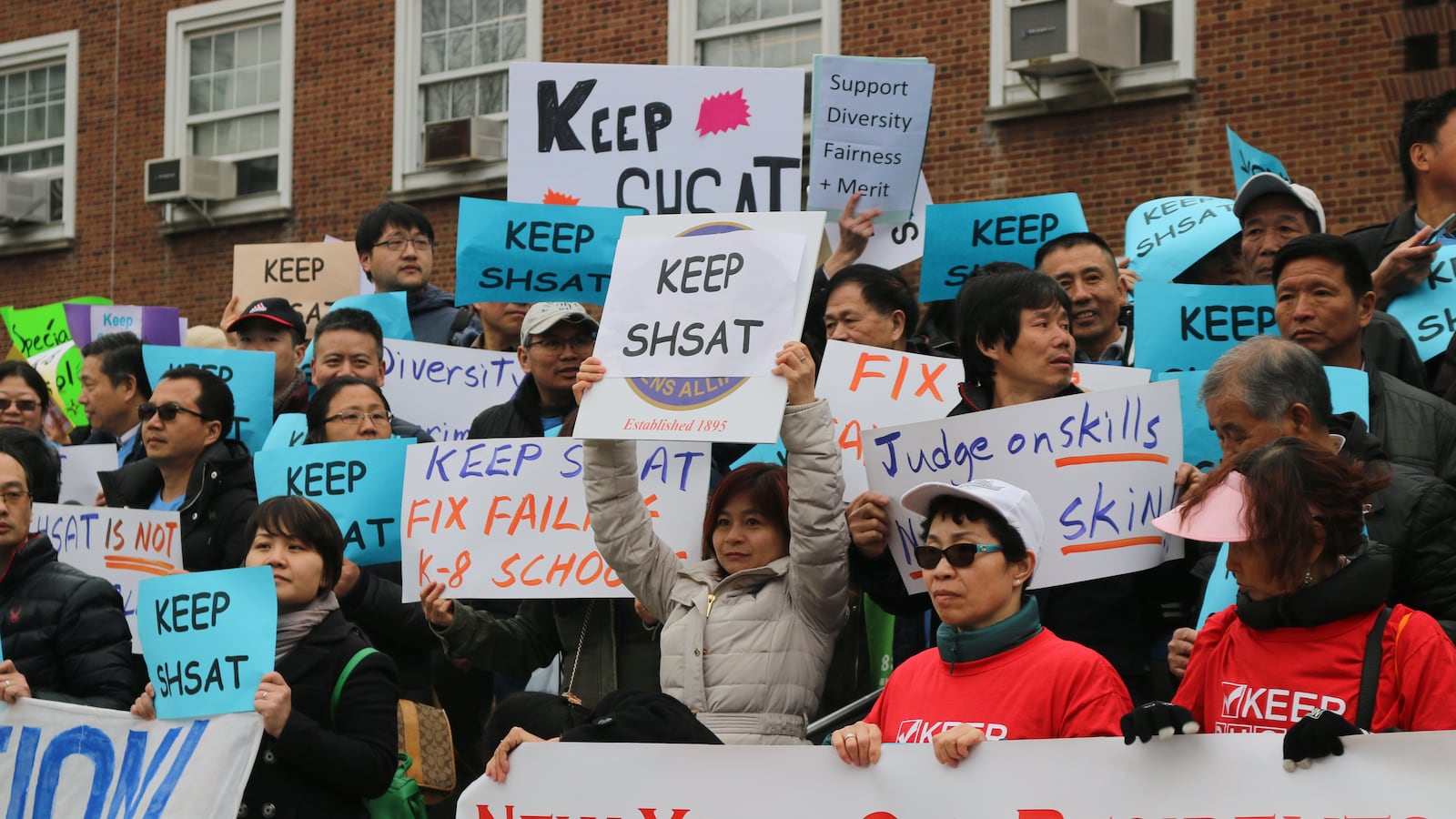A well-funded new group revealed plans Monday to fight the mayor’s push to scrap the specialized high schools admissions exam, advocating instead to broaden access to test preparation and gifted programs.
Dubbed the Education Equity Campaign, the coalition is led by minister and Brooklyn Tech alumnus Kirsten John Foy and is backed by multiple community groups, according to its website. While an exact number wasn’t revealed, the group has raised seven figures in funding, with big names behind the initial dollars: Ronald Lauder, chairman of the Clinique Laboratories and a Bronx Science alumnus, and former Time Warner CEO Richard Parsons, according to a spokesman.
Education Equity’s genesis turns up the pressure on the debate over the test and Mayor Bill de Blasio’s proposal to eliminate it in order to boost diversity at the schools. His plan has drawn sharp blowback, particularly from alumni and some Asian-Americans, who this year earned 51 percent of offers to specialized high schools. Foy described the mayor’s plan as a “politically expedient shortcut” that is “morally questionable” because he believed it pitted the Asian, black and Hispanic communities against each other.
“Quite frankly, we have all been in agreement that the test is an indicator of the problem — it is an indicator of what is wrong with the elementary and middle school educational systems,” Foy told Chalkbeat. “And that is not a reflection on the professionals; it is a reflection on the bureaucracy.”
From town halls and rallies to lobbying, Foy said the new coalition will arrange a “very robust and sophisticated” advocacy effort to build support for a wish list of policies: adding two new specialized high schools in each city borough; guaranteeing free Specialized High School Admissions Test prep for every city student; ensuring all students have access to gifted and talented programs from a young age; asking every eighth grader to take the SHSAT (with the option to opt-out); and “dedicating the resources necessary to improve our city’s struggling middle schools” — which a spokesman said was related to curriculum.
The group’s asks echo many of the counter-proposals that are consistently floated by supporters of the single-test admissions standard, but it’s unclear how effective they would be. Some observers shared skepticism and disappointment about the group’s efforts, including former deputy mayor Richard Buery who tweeted, “I don’t understand why these folks would spend their time and energy to exclude Black and Latinx students from the specialized high schools.”
A spokeswoman for City Hall said the mayor will continue to call for changes to the admissions system, which was enshrined in state law almost 50 years ago after the schools chancellor at the time moved to investigate the lack of diversity at the schools.
“The facts are clear: our best high schools do not represent the diversity that makes our City great. We will not let a few millionaires deter us from reforming this flawed admissions system,” spokeswoman Olivia Lapeyrolerie wrote in an email.
State legislators must change the law to scrap the test. But beyond lawmakers arranging community forums, the matter hasn’t resulted in much action in Albany, and there’s no indication they’ll act before the session ends in June. State records show the coalition will spend at least a total of $147,500 on lobbying efforts from firms Tusk Strategies, Bolton St. John, Patrick B. Jenkins and Associates, and Blue Suit Strategies through the end of the legislative session.
De Blasio’s plan would scrap the admissions test and offer spots to the top 7 percent of students at each middle school.
As education officials presented de Blasio’s plan to the community, Foy and other supporters began building the Education Equity campaign – creating a name, gathering support, and laying out an action plan, he said.
But it’s not clear whether any of the group’s proposals, if enacted, would actually boost diversity at specialized high schools. For example, the city has already expanded DREAM, an after-school program that prepares eligible seventh graders for the admissions test. Since 2016, 700 more students have participated in the program, and the city will nearly double that this year to reach 4,300 students. The city also expanded a program that offers the SHSAT during the school day to 50 schools from 15 in 2017. Still, the specialized schools have remained starkly segregated.
Like the specialized high schools, entry to gifted and talented programs are based on a single test, and the program admits mostly white and Asian students, as well as those from wealthier families.
When asked why his group’s proposal would work, Foy said the city’s efforts were “anemic” and didn’t go as far as Education Equity wants them to go.
Some integration advocates have acknowledged the need to strengthen schools that serve mostly black and Hispanic students, but also argue that waiting for those efforts to pay off ignores that there are currently high-achieving students of color in the system who could do well in specialized high schools if given the chance. Opening more specialized high schools could also serve to deepen segregation, rather than help fix it, since black and Hispanic students are already less likely to attend schools that screen students based on competitive admissions criteria.
“All I can do is hope they are genuine efforts and just misguided,” said Lazar Treschan, youth director at the Community Service Society who has studied specialized high schools, said of the new group’s efforts. “The other side is that these are people who well know that this isn’t going to work because it hasn’t before.”
Correction: A previous version of this story misidentified Ronald Lauder.

